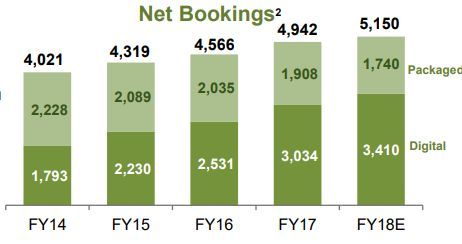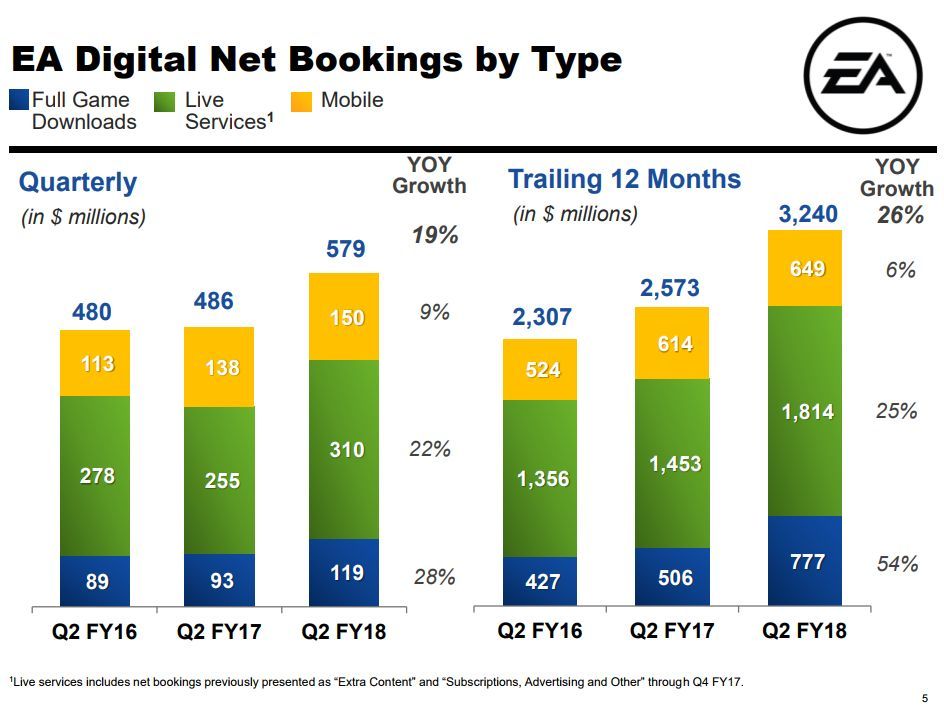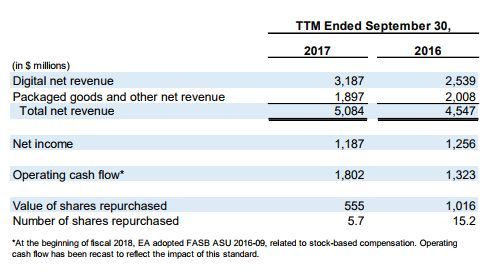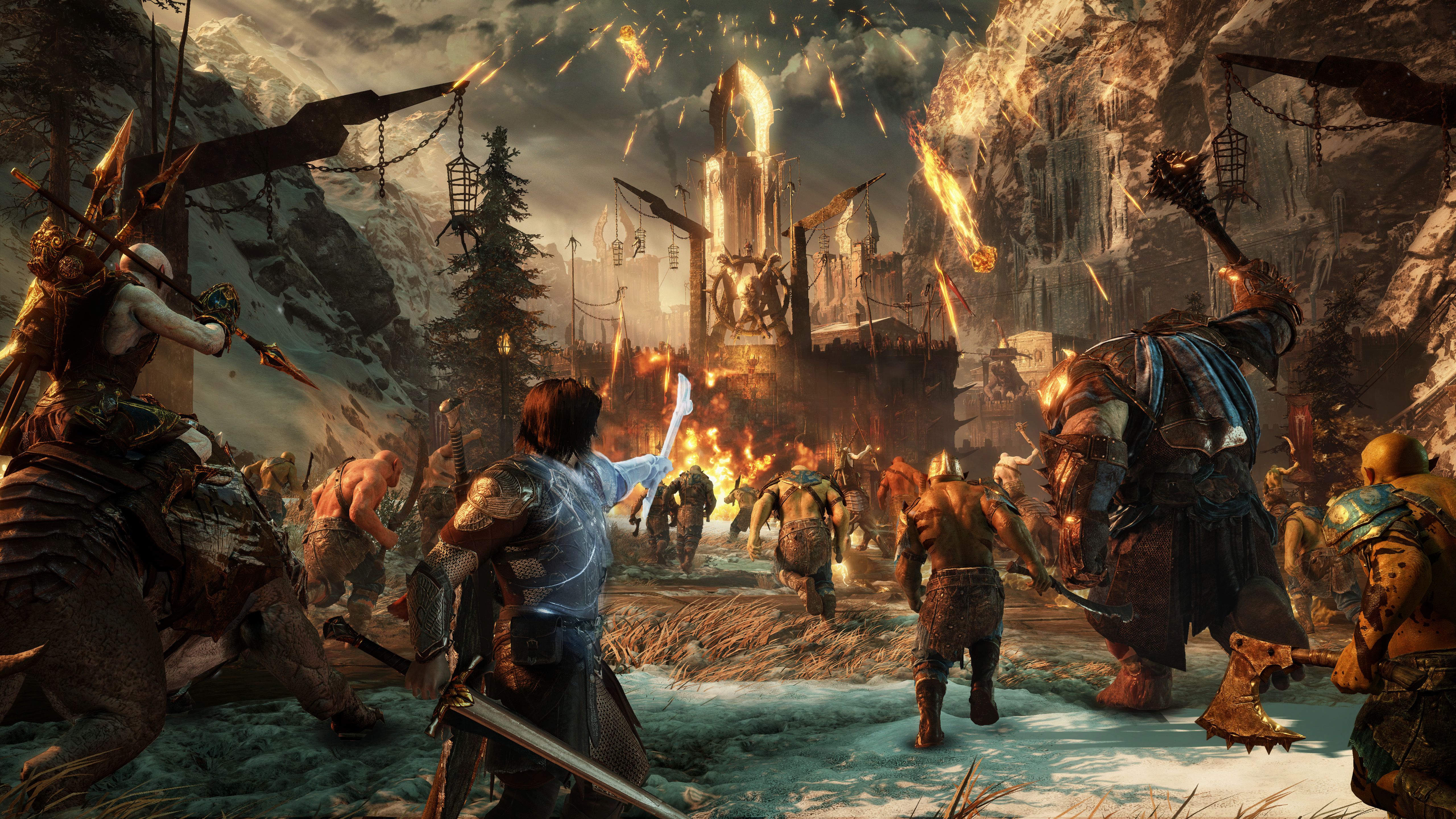Star Wars Battlefront II's release made headlines for the temporary removal of the pervasive microtransactions scheme that caused a large controversy among gamers. Yet, they aren't gone forever, and they will return in some form after the development team changes their inner workings. At the moment, we do not know how.
In recent times, the discourse around microtransactions, live services, expansion passes, and recurring revenue has intensified considerably, mostly because pretty much all the biggest players in the industry have made a strong push to take advantage of those business models. Even Nintendo, that was previously considered immune to this kind of trends, has started moving the first timid steps into seeking recurring income from some of its games and services.
But why is the industry pushing so hard?
Let's take Electronic Arts as an example (all data below is available on the publisher's investor relations portal). Below you can see the proportion of their net bookings (the metric that is replacing "net sales" industry-wide, it's not exactly the same, but almost) in million dollars, between packaged and digital, and how it has progressed over the past few years.
The prevalence of digital sales has become evident since the last fiscal year, but of course, this doesn't tell us what proportion of those digital sales comes from recurring revenues.
Enter the next slide: this shows us what proportion of the digital net bookings are from "live services" in green. This includes extra content and subscriptions, and it is, by all means, massive.
Just how massive is it? Below you can see the financial highlights for the trailing twelve months ended with the second Quarter of the fiscal year 2018 (until September 30th, 2017).
The money that comes in from the live services segment is higher than the net income for the whole company. This gives us an idea of how important those revenues are for the publisher. The same situation can be found more or less everywhere among the big players in the industry.
Let's look at a completely different example with Sony (source). As you can see in the table below, the majority of their sales come not from selling PS4 consoles, but from the network segment, which includes sales made on the PSN and PlayStation's own "recurring revenue" model, PlayStation Plus.
During the latest quarterly financial conference call, Sony Chief Financial Officer Kenichiro Yoshida talked about this rather extensively, confirming that "more than half of the sales for the Game and Network Services in the current fiscal year will be coming from the network."
According to Yoshida-san, this is proving to be a mitigating factor to the usual issues coming with entering in the latter part of a console cycle, where hardware sales gradually drop. He added that "third-party sales of in-game items and content is very significant for Sony as well." While he mentioned that, compared to other companies, on the first-party side the proportion for Sony of in-game sales is still relatively low, under new CEO John Kodera's leadership there will be “appropriate exploration and decisions taken in the future” on the topic.
Take-Two CEO Strauss Zelnick also talked about this during the publisher's latest investor call, mentioning that all games from Take-Two and its subsidiaries (Rockstar and 2K Games) will have "some way to engage on an ongoing basis." He also explained that this shift towards recurring revenue has been "transformative" for the company.
That's not so surprising, considering that Take-Two has been making truckloads of money with Grand Theft Auto Online and its microtransactions and content drops.
I could go on all day, but I think it's pretty clear that microtransactions, live services and recurring revenues in general are a massive source of income for publishers, and in many cases are the primary contributing factor that turned struggling companies into profitable and financially solid ones.
The most extremist fringe among those who oppose this kind of revenue (I'm not counting those who would just want to see companies "crash and burn" because this position is honestly not worthy of consideration), would like to see microtransactions gone altogether.
Unfortunately, this is a pretty naive point of view, because recurring revenues are a primary factor in what makes the industry sustainable, especially on the side of large publishers working on games that are costing more and more to produce.
There is also another element that many don't consider, and that affects games like Star Wars Battlefront II and more, including the vast majority of the biggest sports games. Their profit margin is considerably lower due to the fact that the publisher has to pay rich royalties for the license, either to Disney or to this or that sports league. That's why those games often come with the most aggressive recurring revenue models.
Ultimately, whether we like them or not, microtransactions are here to stay, alongside all the whole recurring revenue and live services mumbo jumbo. At this point, they have become quite close to a matter of survival, and large publishers probably wouldn't be able to get rid of them even if they wanted to (and they don't want to anyway).
That being said, this is probably the most "painful" period. While recurring revenues have been around for a while, western publishers are still in an experimentation phase. They're exploring possibilities and testing the waters, which leads to clumsy designs and redesigns like those we have seen in the latest Star Wars game.
Asian developers have been at it much longer, so their models are established and largely accepted by their customer base. The issue, of course, is that said customer base is much different from the one you find in the west, so simply copying from what is done in Korea and China often does more harm than good.
Given that microtransactions and live services are here to stay, it's probably more beneficial, instead of taking an "all-or-nothing" stance, to shift our attention on how they can be done right.
The basic "live service" concept behind Star Wars Battlefront II is actually much better than what many give it credit for. The publisher pledges to support the game for a long time, providing regular drops of content at no additional cost (I personally dislike saying "for free," because nothing is really free). On the other hand, the burden of paying for that content is shifted from everyone who wants to play it, to those who can or are willing to partake in microtransactions.
The problem is that, for the concept to really work for everyone (publishers and customers), microtransactions need to be balanced between being attractive so that a relevant amount of people do pay, and not being basically a hidden price that one must pay in order to enjoy the game and its features. As Star Wars Battlefront II aptly demonstrated, this is not an easy balance to strike.
An obvious mitigating factor is to make all microtransaction elements cosmetic-only, pretty much like Overwatch does. That being said, Overwatch isn't exactly one of the most costly games to develop (unless you count in the costs the cancellation of Titan, but that's a different story). It has no single player campaign, and its cartoony style saves a lot of money over the technological requirements of more realistic titles. It's also an original IP, so none of those pesky royalties are owed to anyone outside of Blizzard.
There is also the fact that not all games lend themselves to a large number of cosmetic variations, and games based on licenses like Star Wars have even more creative restrictions in that area.
The possible trend we might see going forward is the aggressiveness of microtransactions and live service elements being based on costs and margins. Cheaper games to make with higher margins will probably afford milder revenue solutions, while games that require higher investments, will have a stronger push on recurring revenues. It's pretty much just the nature of the beast, but a lot can still be done to make those revenue models fairer.
One very good example of a somewhat "virtuous" solution is what we have seen from Rockstar and Grand Theft Auto Online, and has been pretty much reproduced with Square Enix and the Comrades expansion to Final Fantasy XV (even if we don't yet know how the publisher will monetize it in the future). I also expect Rockstar to opt for a very similar approach with Red Dead Redemption 2.
Basically, those publishers delivered full-fledged high-quality single player games without burdening them with the worst examples of microtransactions (Final Fantasy XV has some DLC, but those are a few irrelevant cosmetics, and some meaty story content that fans normally welcome). Then, after things are said and done, they recycled most of the games' assets to create relatively low-cost online games that keep users highly engaged with the franchise, which has the additional effect of improving its long-term value and attractiveness. At this point, they can focus the microtransactions and live services part of the business in the online game.
With this kind of model, pretty much everyone wins: the publisher gets its live service with plenty of recurring engagement and revenue. Players that only enjoy single player games can go on adventures on their own without having the bill shoved in their faces every ten minutes. They're also entirely free to completely ignore the online spin-off. Those who enjoy multiplayer games get their fill as well, and can choose to either engage monetarily or not, depending on what they like. Players that like a bit of both get pretty much everything they want.
While this solution has been applied to only a limited number of games for now, and it naturally works best with open world games (but I'm sure clever developers will find ways to apply it to other genres), just think about the many games that could benefit from it.
While I don't want to give ideas to a developer that for now has held back on recurring revenues (but I would be surprised if they didn't think about it on their own), I can't say I wouldn't absolutely love to explore and fight with friends in the beautiful and grim world of The Witcher 3: Wild Hunt, or ride alongside other players and explore tombs in the giant deserts of Assassin's Creed Origins. Cooperative Orc husbando raising in Middle Earth: Shadow of War? Count me in.
The main point is that this kind of approach actually adds value and engagement for players, instead of just gating it behind a paywall. The same goes for giving all DLC at no additional cost when combined with fair microtransactions. While many executives talk a lot about this concept of live services adding value and long-term engagement that customers can enjoy (you hear it during every single financial conference call nowadays), I don't think many of them have fully grasped how to do it right just yet. As Sony's Kenichiro Yoshida said, "appropriate exploration" is required, instead of flinging shit at the wall and hoping that something sticks.
Of course, collaboration and balanced feedback from players would certainly help in that exploratory process, while extreme "us against them," "crash and burn, you evil publisher," or "remove all microtransactions or else" attitudes tend to muddle the dialogue into a shouting contest.
I have often noticed a rather weird attitude among certain gamers, who think that publishers making money is somehow a bad thing. Words like "greed" and "anti-consumer" are thrown around not always appropriately. Publishers are businesses, so their whole purpose is making money. It's not a matter of greed. It's a matter of survival.
That being said, the more money flows in the coffers of publishers, the more of that money is re-invested in making bigger and better games, in R&D to improve fields that still need a lot of help like artificial intelligence, and in supporting the occasional risky project. It's also partly given back to investors to convince them to invest even more. Ultimately, all that money helps to keep developers into a job and producing the games we enjoy.
Some believe that higher income simply means that overly-rich executives with grubby hands will buy themselves a new Ferrari, and that certainly is a factor: executives love to give themselves performance bonuses. Yet, make no mistake: all is proportional. A large percentage of that additional revenue coming from microtransactions and live services gets reinvested into studios and games.
As gamers, we should definitely be supportive of an industry that makes money, the more the better. On the other hand, publishers should strive to make that money in the fairest way sustainable. It doesn't need to be us against them, as long as the advantages go both ways. There already are examples of that, and hopefully, many more will come with further exploration and dialogue.









